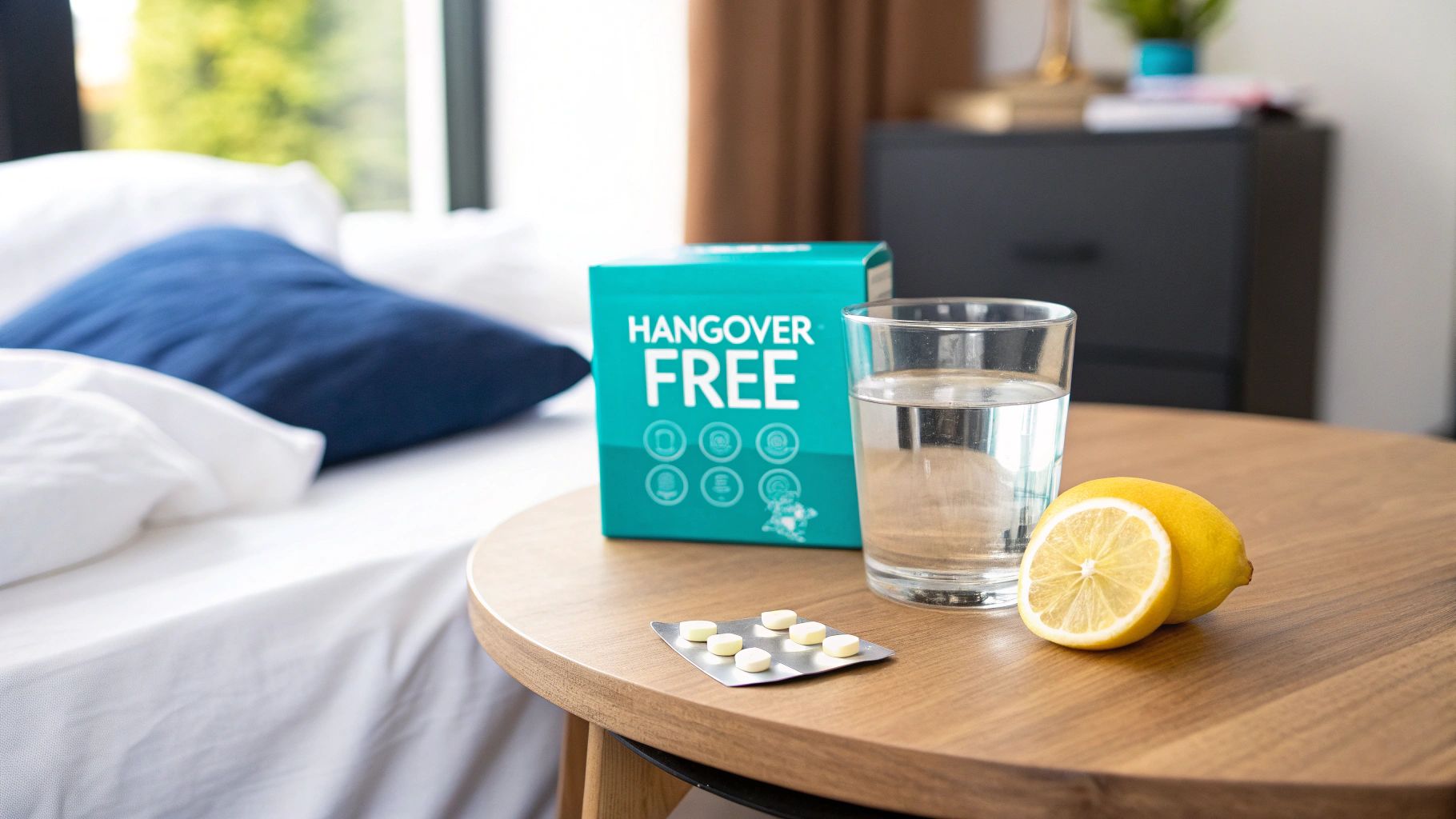

· By Annemarie
8 Effective Hangover Prevention Tips for 2025
Waking Up Refreshed: Your Guide to a Hangover-Free Life
Hangovers can derail your day. This listicle provides effective hangover prevention tips so you can enjoy social events without the regret. Learn how simple strategies, from hydration and food choices to smart supplementation and pacing, can minimize or even eliminate those dreaded hangover symptoms. We'll cover eight key strategies, including staying hydrated, eating beforehand, choosing drinks wisely, pacing yourself, supplementing with NAC, limiting your intake, getting enough sleep, and avoiding mixing alcohol types. These evidence-based tips empower you to wake up feeling refreshed.
1. Stay Hydrated with Water
One of the most effective hangover prevention tips is also the simplest: stay hydrated with water. Alcohol is a diuretic, meaning it causes your body to lose more water than it takes in. This dehydration is a primary culprit behind many hangover symptoms, including headache, fatigue, and nausea. By drinking sufficient water before, during, and after alcohol consumption, you can help maintain hydration levels and significantly mitigate the severity of a hangover. This simple strategy tackles the root cause of many hangover woes, making it a crucial part of any hangover prevention plan.
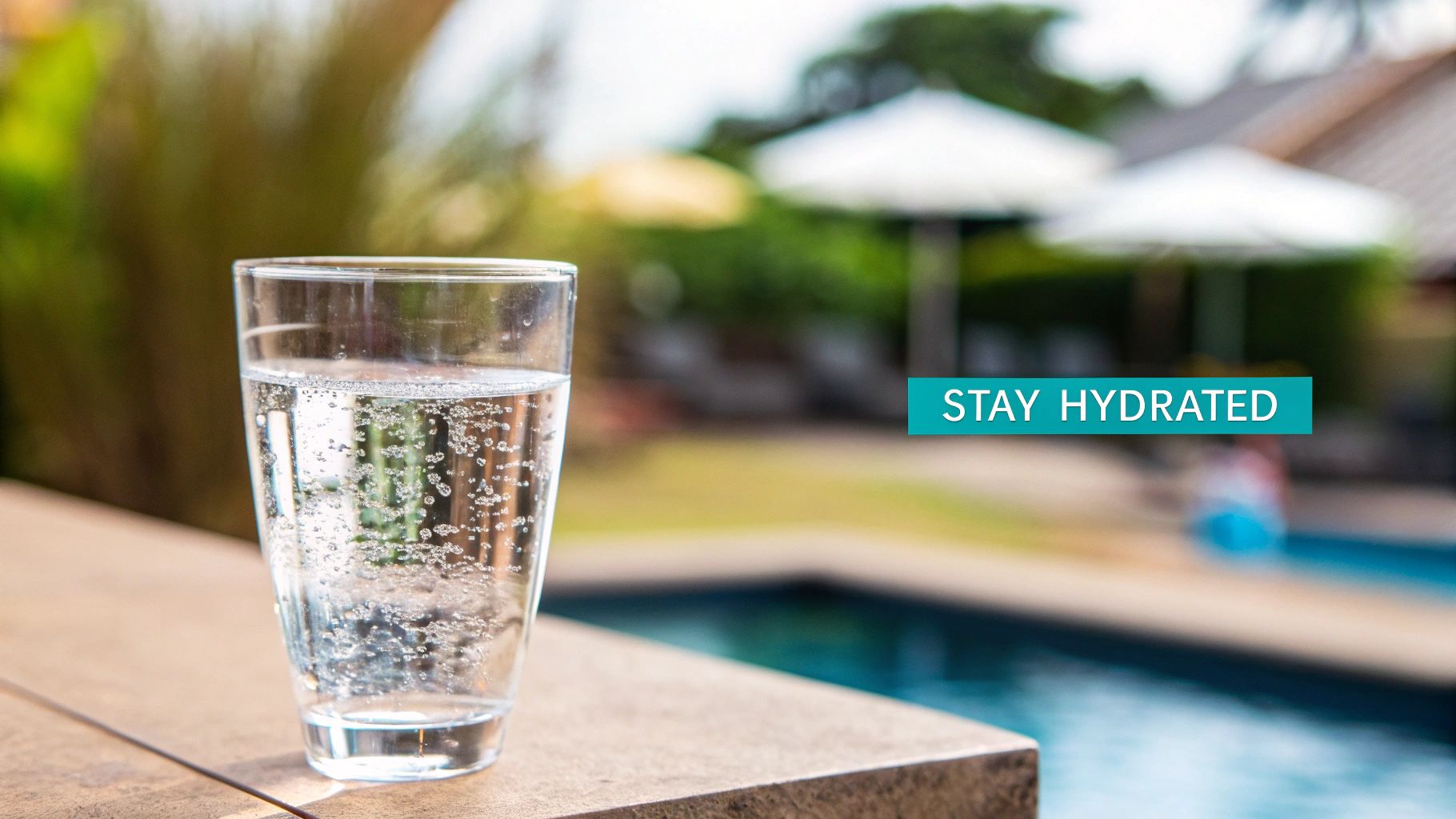
Staying hydrated counteracts alcohol's diuretic effect, helping your body maintain a healthy electrolyte balance crucial for proper function. Water also assists in flushing out toxins, further reducing the burden on your system. This cost-free strategy has no side effects and addresses a primary cause of hangover symptoms, making it a cornerstone of effective hangover prevention. While some other hangover "cures" on the market may offer quick fixes, they often fail to address this fundamental issue of dehydration, making water a superior choice. Learn more about Stay Hydrated with Water
Examples of Successful Implementation:
- Alternating alcoholic drinks with glasses of water: This is a simple yet highly effective method to pace yourself and maintain hydration throughout the night.
- Drinking a large glass of water before bed after a night out: Replenishing fluids before sleep helps your body rehydrate while you rest.
- Using hydration apps to track water intake during social events: Technology can help you stay mindful of your water consumption, especially in busy or distracting environments.
Actionable Tips for Readers:
- Aim for at least one glass of water for every alcoholic drink. This 1:1 ratio helps counteract the dehydrating effects of alcohol in real-time.
- Drink 16-20 oz of water before going to sleep after drinking. This provides a significant hydration boost before your body begins its recovery process.
- Consider electrolyte-enhanced water for better hydration. Electrolytes are lost through alcohol's diuretic effect, and replenishing them can aid in faster recovery.
- Set reminders on your phone to drink water while out. Reminders can be invaluable, particularly if you're engrossed in conversation or enjoying the festivities.
Pros:
- Cost-free strategy
- No side effects
- Addresses a primary cause of hangover symptoms
Cons:
- Requires planning and discipline
- May cause frequent urination when combined with alcohol
- Not a complete solution on its own (though significantly reduces hangover severity)
This method, popularized by healthcare professionals, nutritionists, and fitness experts like celebrity trainer Harley Pasternak, deserves its place on this list because of its simplicity, effectiveness, and accessibility. While other approaches might offer temporary relief, hydration tackles the core issue of fluid loss, making it a fundamental step in preventing hangovers.
2. Eat a Substantial Meal Before Drinking
One of the most effective hangover prevention tips is also one of the simplest: eat a substantial meal before you start drinking. Consuming a balanced meal high in protein, healthy fats, and complex carbohydrates before alcohol consumption slows the absorption of alcohol into your bloodstream. Think of food in your stomach as a sponge, soaking up the alcohol and reducing the rate at which it enters your system. This gives your body more time to metabolize the alcohol effectively, lessening its negative impact.
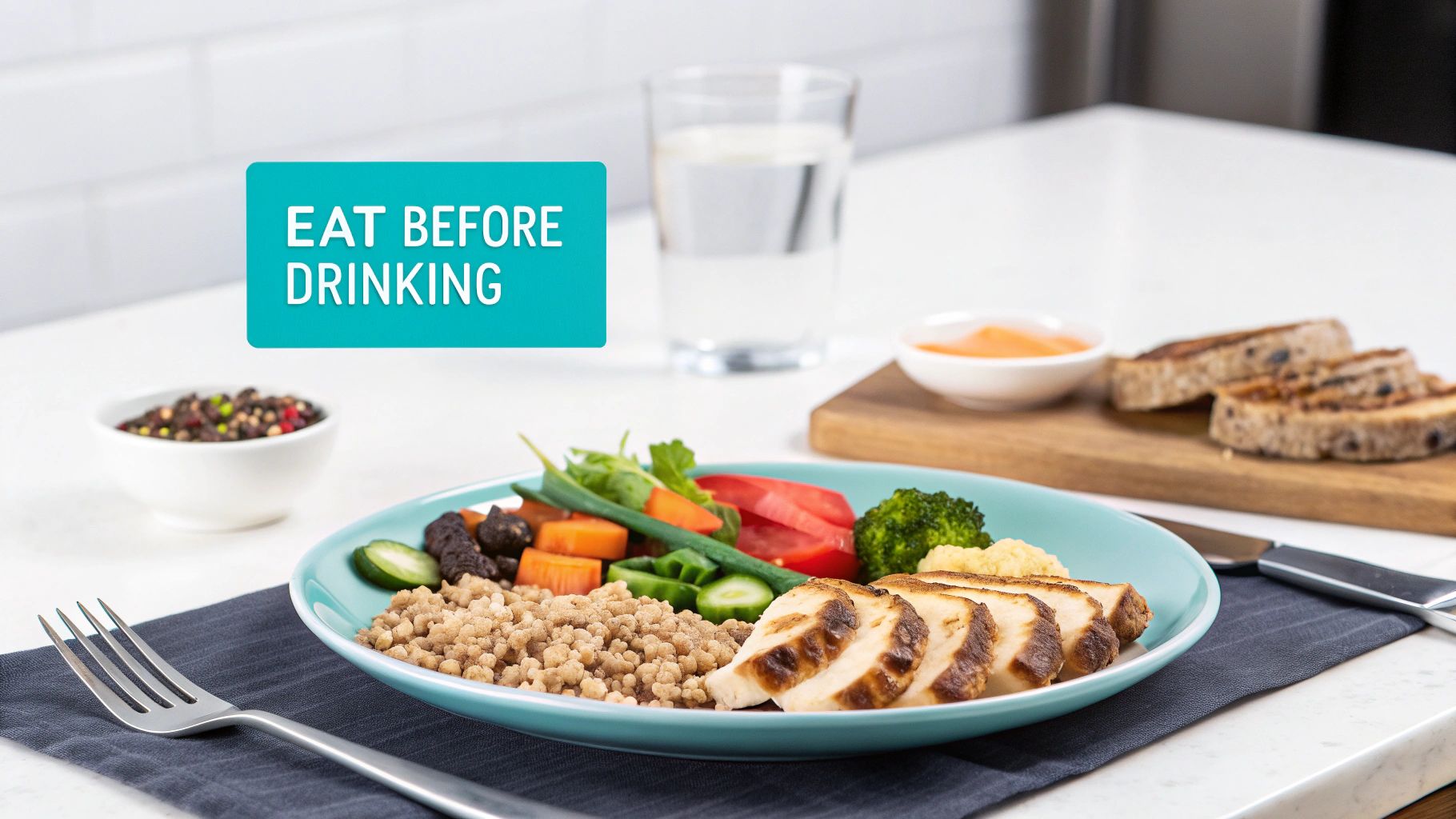
This approach offers several key features that contribute to a better drinking experience and reduce the likelihood of a hangover. It slows the alcohol absorption rate, provides essential nutrients that support liver function (your liver is your primary organ for alcohol processing), and helps stabilize blood sugar levels, which can fluctuate when drinking. The benefits are clear: a reduced peak blood alcohol concentration (meaning you won't get as drunk as quickly), minimized stomach irritation from alcohol, and a potentially enhanced social drinking experience as you can pace yourself better.
While other hangover "remedies" may offer quick fixes (and often fall short), proactively eating beforehand addresses the root cause of hangovers: the rapid absorption and processing of alcohol. This simple yet effective strategy sets it apart from less reliable methods.
Of course, there are a few considerations. Some individuals may find that eating beforehand reduces the desired effects of alcohol, meaning they might need to drink more to achieve the same level of intoxication. This, however, can be a positive for those looking to moderate their intake and avoid overconsumption. It also requires some advance planning, as grabbing a quick snack after you've already started drinking won't provide the same benefits. Timing is key – this method is ineffective if eating occurs after drinking has begun.
Examples of successful implementation include enjoying Mediterranean diet meals rich in olive oil and proteins before a night out, the tradition of hearty pub meals in Britain enjoyed before drinking sessions, or pre-game dinners before social gatherings.
To maximize the effectiveness of this hangover prevention tip, focus on meals containing complex carbohydrates like whole grains (brown rice, quinoa, whole wheat bread), include healthy fats from avocados, nuts, or olive oil, and add lean proteins such as chicken, fish, or legumes. Avoid excessively salty foods that might increase thirst and subsequently lead to faster alcohol consumption.
Experts like gastroenterologists, nutritionist Keri Gans, and even celebrity chef Gordon Ramsay, who advocates 'lining your stomach,' have popularized this method. By following this simple advice, you can take control of your drinking experience and significantly reduce your chances of waking up with a hangover. This preemptive approach empowers you to enjoy social occasions without the dreaded next-day consequences, making it a crucial addition to any list of hangover prevention tips.
3. Choose Drinks Wisely
One of the most effective hangover prevention tips involves understanding the impact of your drink choices. The type and quality of alcoholic beverages you consume significantly influence hangover severity. This is due to congeners, toxic chemical byproducts of fermentation, which are present in varying amounts depending on the alcohol. Darker drinks like red wine, bourbon, and whiskey contain higher levels of these congeners, exacerbating hangover symptoms. Conversely, clearer alcohols such as vodka, gin, and light rum typically contain fewer impurities, potentially leading to a less intense hangover. Choosing your drinks wisely can be a game-changer when it comes to enjoying a night out without paying the price the next morning.
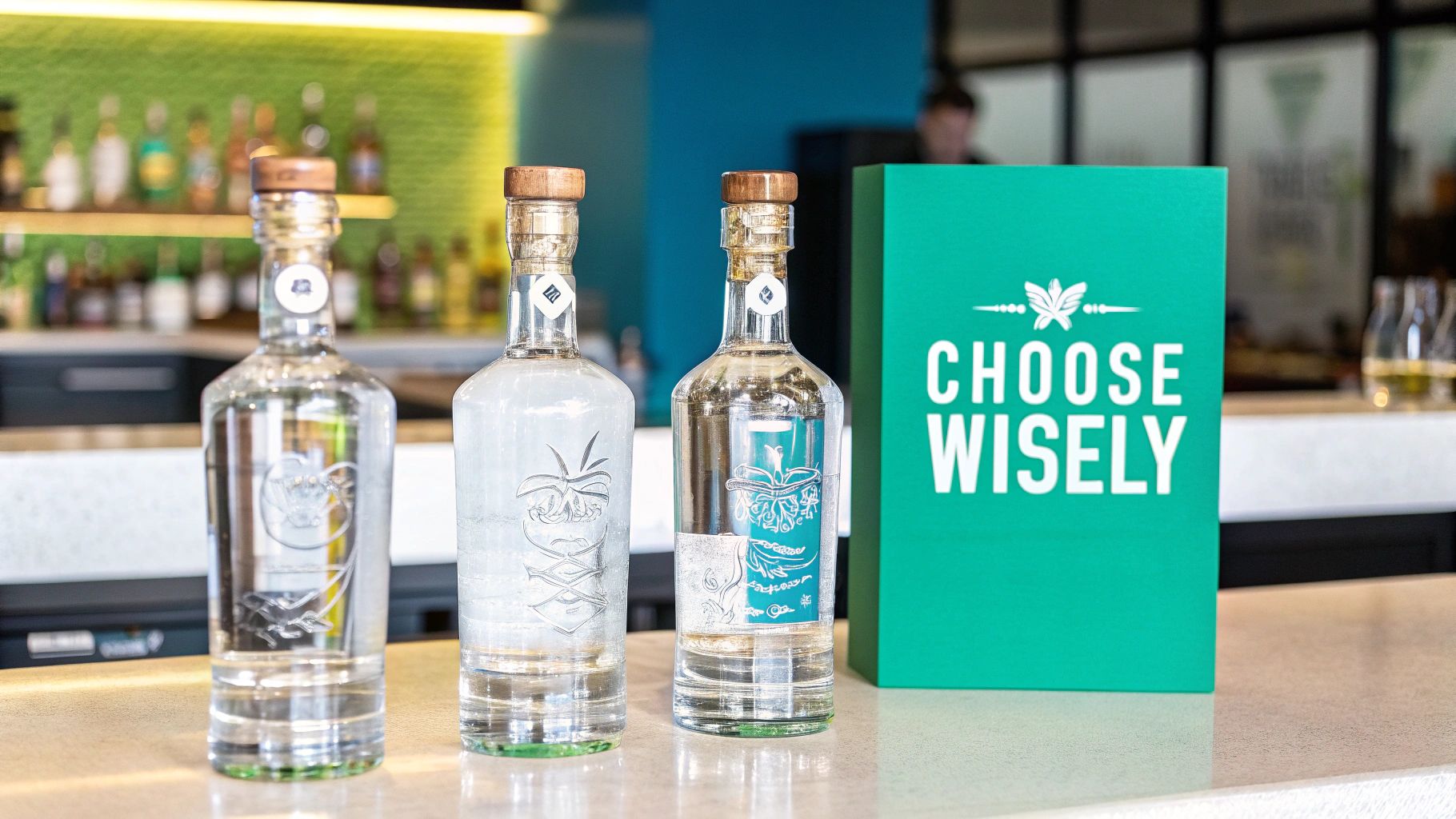
This approach deserves a spot on any hangover prevention list because it empowers you to make informed decisions about your alcohol consumption. By focusing on congener content and prioritizing quality over quantity, you can potentially reduce hangover intensity without abstaining from alcohol altogether. This method promotes a more mindful approach to drinking, encouraging you to savor the experience rather than just chasing intoxication. Learn more about Choose Drinks Wisely
Examples of Successful Implementation:
- Switching from red wine to white wine: This simple swap can significantly reduce your congener intake.
- Opting for premium vodka over cheaper options: Higher-quality vodka often undergoes better filtration processes, removing more impurities.
- Avoiding sugary mixed drinks: Sugary additions can worsen dehydration and blood sugar fluctuations, contributing to a harsher hangover.
Actionable Tips for Readers:
- Choose clear spirits: Opt for vodka, gin, or light rum instead of whiskey, tequila, or red wine.
- Prioritize quality: Select higher-quality brands known for their superior filtration processes.
- Skip the sugary mixers: Avoid sugary mixers and opt for soda water, tonic water, or fresh juices instead.
- Be mindful of cocktails: Be wary of cocktails with multiple types of alcohol, as they can increase your overall congener intake.
When and Why to Use This Approach:
This strategy is beneficial anytime you plan to consume alcohol. Whether you're a social drinker, a nightlife enthusiast, a health-conscious individual, a busy professional, or a frequent traveler, making informed choices about your beverages can significantly improve your overall well-being. By understanding the role of congeners, you can minimize the negative consequences of alcohol consumption and enjoy a more vibrant and productive life.
Pros and Cons:
Pros:
- Reduced hangover intensity
- Potentially fewer toxic compounds to process
- May lead to more mindful drinking habits
Cons:
- Higher-quality alcohols can be more expensive
- Limits beverage choices
- Congener sensitivity varies among individuals
While some services may offer general hangover remedies, understanding the science behind alcohol selection and focusing on proven prevention methods like choosing your drinks wisely, as detailed here, offers a more proactive and personalized approach to minimizing hangover symptoms. This empowers you to take control of your drinking experience and prioritize your well-being.
4. Pace Your Drinking
One of the most effective hangover prevention tips is pacing your drinking. This method involves controlling your alcohol consumption rate to give your body enough time to metabolize the alcohol, thus preventing a buildup of acetaldehyde. Acetaldehyde is a toxic byproduct of alcohol metabolism and a major contributor to those dreaded hangover symptoms. Your liver can typically process about one standard drink (a 12-ounce beer, a 5-ounce glass of wine, or a 1.5-ounce shot of distilled spirits) per hour.
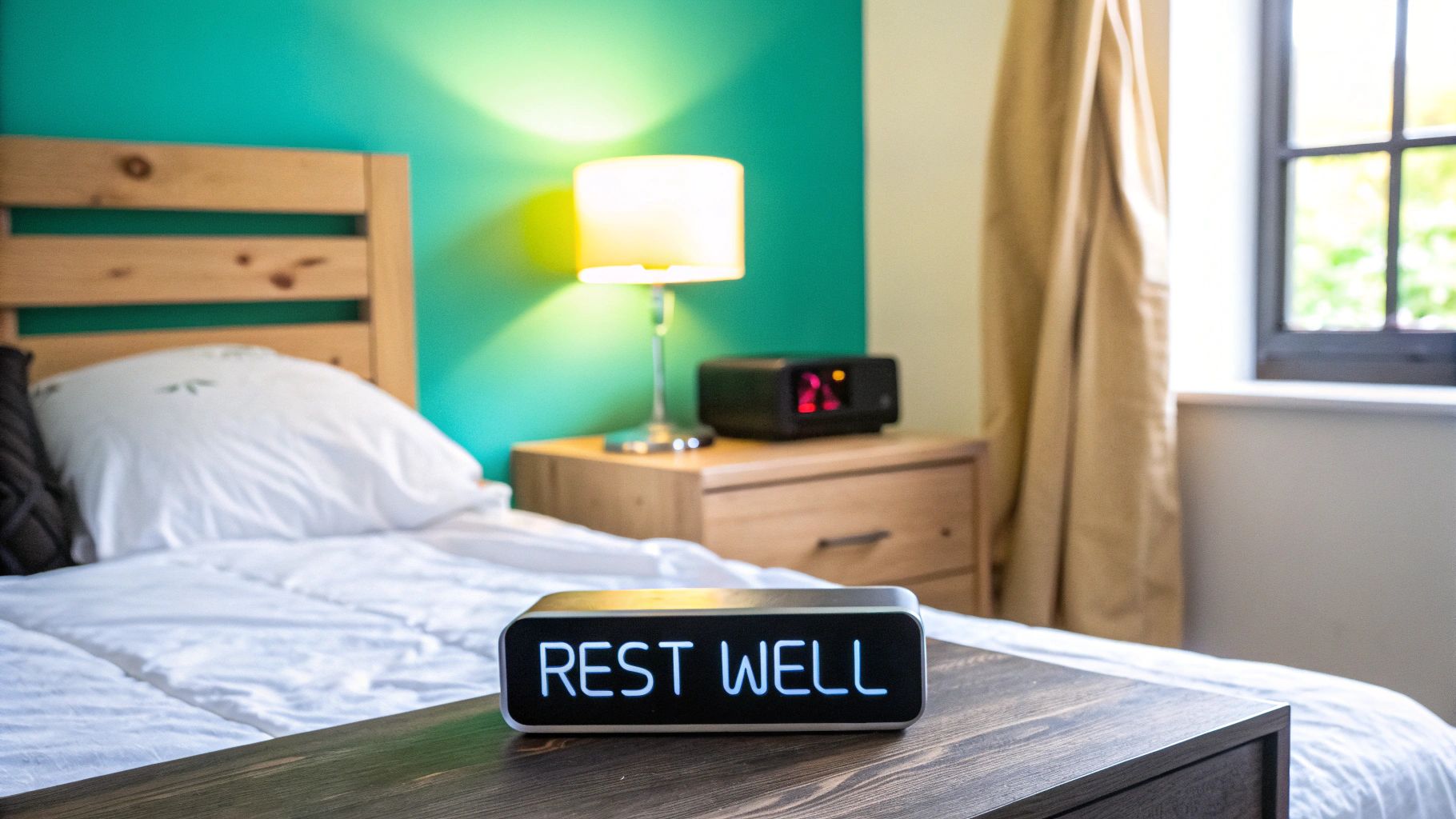
Pacing aligns with your body's natural metabolic rate of alcohol processing. This prevents rapid spikes in blood alcohol content (BAC), which helps you maintain better judgment throughout your drinking session. By keeping your BAC at a manageable level, you’re less likely to experience the negative consequences associated with excessive drinking. This approach is particularly beneficial for social drinkers, nightlife enthusiasts, health-conscious individuals, busy professionals, and frequent travelers who want to enjoy social events without sacrificing their well-being or productivity the next day.
This strategy deserves a place on this list because it’s a simple yet powerful way to take control of your drinking habits and minimize the risk of hangovers. The benefits are clear: reduced overall consumption, maintained social engagement without excessive intoxication, and an increased awareness of your limits. It's easier to stay hydrated when you're pacing yourself, another key factor in hangover prevention.
Pacing your drinking comes with its own set of challenges. You may face social pressure to drink faster, and maintaining this practice requires self-discipline, particularly in festive or high-pressure social settings where tracking can be difficult.
Examples of successful implementation:
- Setting a drink timer on your smartphone serves as a helpful reminder to maintain your pace.
- Participating in mindful drinking movements such as "Dry January" helps build awareness around alcohol consumption habits.
- Observing the disciplined approach of professional athletes who carefully monitor their alcohol intake provides further inspiration.
Actionable Tips for Pacing Your Drinking:
- Limit consumption to one standard drink per hour: This aligns with the liver's processing capacity.
- Use apps: While some apps exist to track intake, be sure to choose one that best suits your needs and avoid those that might promote excessive consumption.
- Engage in non-alcohol-centric activities: Focus on conversations, games, or dancing rather than just drinking.
- Practice saying "no": Politely decline drink offers when you're pacing yourself. A simple "I'm pacing myself tonight" can be effective.
This method has been popularized by addiction specialists, health organizations like the CDC and WHO, and mindful drinking advocates like Ruby Warrington. By following these simple steps, you can enjoy social occasions responsibly and wake up feeling refreshed.
5. Take N-acetylcysteine (NAC) or Other Supplements
Dealing with a hangover can derail your entire day. One promising approach to hangover prevention involves supporting your body's natural detoxification processes with targeted supplements. This proactive strategy can help mitigate the negative effects of alcohol before they even start. Learn more about Take N-acetylcysteine (NAC) or Other Supplements
Alcohol metabolism depletes the body of essential nutrients and creates harmful byproducts, contributing significantly to hangover symptoms. Supplementation aims to replenish these lost nutrients and bolster the body's defenses against alcohol-induced stress. N-acetylcysteine (NAC) is a particularly popular choice. It works by replenishing glutathione, a potent antioxidant crucial for liver detoxification. Essentially, NAC gives your liver a boost, helping it efficiently process alcohol and its byproducts. Other beneficial supplements include B vitamins, which are depleted by alcohol consumption, milk thistle, known for its liver-supporting properties, and Dihydromyricetin (DHM), used in traditional Chinese medicine for its purported ability to alleviate alcohol's effects.
Several features make this hangover prevention tip stand out:
- Supports liver detoxification pathways: NAC and milk thistle specifically aid the liver in processing alcohol.
- Replenishes nutrients depleted by alcohol: B vitamins address the nutritional deficits caused by drinking.
- Some have anti-inflammatory properties: Certain supplements can help combat the inflammation that contributes to hangover discomfort.
The benefits of this approach are numerous:
- Addresses biochemical aspects of hangovers: Instead of just treating symptoms, this method targets the underlying causes.
- Can be taken preventatively: You can take these supplements before drinking to prepare your body.
- May provide additional health benefits beyond hangover prevention: Many of these supplements offer general health benefits, such as antioxidant protection and liver support.
However, it's crucial to be aware of the potential downsides:
- Scientific evidence varies in quality and quantity: While some research supports the use of these supplements, more studies are needed.
- Potential interactions with medications: Always consult with a healthcare professional before taking new supplements, especially if you're on other medications.
- Not regulated by FDA for hangover prevention claims: Be sure to choose reputable supplement brands and be aware that specific hangover prevention claims may not be FDA-approved.
Examples of Successful Implementation:
- DHM: Its use in traditional Chinese medicine suggests a long history of mitigating alcohol's effects.
- NAC: Clinical trials have demonstrated NAC's liver-protective properties.
- B Vitamins: Several B-complex vitamin products are marketed specifically for hangover prevention, although their efficacy varies.
Actionable Tips for Readers:
- NAC: Take 600-1200mg approximately 30 minutes before you start drinking.
- B-complex vitamin: Consider taking a B-complex vitamin before drinking and again before bed.
- Milk thistle extract: Incorporate milk thistle extract for additional liver support.
- DHM: Research DHM supplements and ensure they contain adequate dosages (300-1200mg).
This approach to hangover prevention has gained popularity through the work of functional medicine doctors like Dr. Mark Hyman, supplement companies like Thorne Research and Life Extension, and biohackers like Dave Asprey. While other companies might promote similar solutions, always prioritize quality and scientific backing when choosing supplements.
This tip deserves its place on the list because it offers a proactive and targeted way to address the root causes of hangovers. By supporting your body’s natural detoxification processes and replenishing lost nutrients, you can significantly reduce the likelihood and severity of hangover symptoms, allowing you to enjoy your social life without paying the price the next day. Remember to always consult a healthcare professional before starting any new supplement regimen, especially if you have pre-existing health conditions or are taking other medications.
6. Monitor and Limit Alcohol Quantity
One of the most effective hangover prevention tips revolves around a simple, yet powerful concept: moderation. Specifically, monitoring and limiting your alcohol quantity is crucial for preventing the dreaded morning after. This approach directly addresses the root cause of hangovers – consuming more alcohol than your body can process. By understanding how much you're drinking and setting limits beforehand, you significantly reduce your risk of experiencing those unpleasant hangover symptoms. This proactive approach deserves its place on this list because it empowers you to take control of your drinking habits and enjoy a night out without sacrificing the next day.
This strategy works by establishing personal thresholds based on individual tolerance. It involves using precise measurements of standard drinks and keeping track of your total alcohol intake throughout the evening. This allows you to maintain consumption at levels your body can handle, minimizing the negative aftereffects.
Why This Approach Works:
- Directly Addresses the Cause: Hangovers are primarily caused by excessive alcohol consumption. By limiting your intake, you directly mitigate the primary trigger.
- Promotes Responsible Drinking: Mindful consumption encourages healthier drinking habits overall, contributing to long-term well-being.
- Tailored to You: This method can be adjusted based on your individual metabolic capacity, weight, sex, medications, and previous reactions to alcohol.
Examples of Successful Implementation:
- The 0-0-1-3 Rule: This easy-to-remember guideline suggests 0 drinks if driving, 0 drinks if underage, a maximum of 1 standard drink per hour, and a maximum of 3 standard drinks per occasion.
- National Guidelines: Many countries, like Australia, have established national drinking guidelines recommending no more than 10 standard drinks per week.
- Designated Driver Programs: These programs encourage responsible consumption by having one person abstain from alcohol entirely to ensure everyone gets home safely.
Actionable Tips for Limiting Alcohol Intake:
- Know Your Limits: Before you go out, set a firm limit for how much you'll drink. Inform your friends to help with accountability.
- Standard Drink Awareness: Understand what constitutes a standard drink: 12oz (355ml) of regular beer (5% ABV), 5oz (148ml) of wine (12% ABV), or 1.5oz (44ml) of distilled spirits (40% ABV).
- Track Your Drinks: Use a tracking app, a simple tally system, or even just keep a mental note of each drink you consume.
- Personal Factors: Consider your weight, sex, medications, and any previous negative reactions to alcohol when setting your limits.
- Hydration is Key: Alternate alcoholic beverages with water throughout the night to stay hydrated.
Pros and Cons:
- Pros: Directly combats the primary cause of hangovers, promotes responsible drinking habits, and can be personalized.
- Cons: Requires self-control, which can be challenging in social situations. Individual alcohol tolerance also varies and can change over time.
This method, popularized by public health organizations like the NIAAA and responsible drinking campaigns, empowers individuals to take control of their alcohol consumption and enjoy a healthier and happier social life. While other companies might offer general hangover remedies, focusing on prevention through mindful consumption, like we advocate, is the most effective long-term strategy.
7. Get Adequate Sleep: Your Body's Best Hangover Defense
Among the most effective hangover prevention tips is prioritizing sleep. While often overlooked in the aftermath of a social gathering, quality sleep plays a crucial role in mitigating the unpleasant effects of alcohol. This tip deserves its place on the list because it addresses the root cause of many hangover symptoms: alcohol's disruptive impact on your natural sleep cycle.
Alcohol, while initially inducing drowsiness, significantly reduces REM sleep – the restorative phase crucial for cognitive function and memory consolidation. It also fragments sleep patterns, leading to frequent awakenings and overall poor sleep quality. This disruption exacerbates hangover symptoms like fatigue, headaches, and difficulty concentrating. Ensuring sufficient, high-quality sleep before and after drinking allows your body to more effectively process and eliminate toxins, reducing the duration and intensity of a hangover.
How Quality Sleep Combats Hangovers:
This hangover prevention tip focuses not just on the duration of sleep, but crucially on its quality. While getting enough hours is important, it's the restorative nature of uninterrupted sleep that truly aids recovery. Alcohol disrupts this restorative process, meaning even if you sleep for a long time after drinking, you may still wake up feeling groggy and unwell. By prioritizing a consistent and healthy sleep schedule, you support your body’s natural detoxification processes and give it the best chance to bounce back after alcohol consumption.
Examples of Sleep's Impact:
Many high-achievers, even those with demanding social schedules, recognize the importance of sleep. Think of tech CEOs known for their stringent sleep hygiene practices, or professional athletes who prioritize rest and recovery after team celebrations. Furthermore, data from sleep tracking devices clearly demonstrates the negative impact of alcohol on sleep cycles, reinforcing the importance of this hangover prevention tip.
Actionable Tips for Better Sleep After Drinking:
- Plan Ahead: Schedule your drinking sessions to end at least 3-4 hours before your intended bedtime. This allows your body some time to begin processing the alcohol before you sleep.
- Optimize Your Sleep Environment: Create a cool, dark, and quiet bedroom conducive to restful sleep. This includes minimizing noise and light pollution.
- Ditch the Screens: Avoid screens (phones, tablets, computers) for at least 30 minutes before bed. The blue light emitted from these devices can interfere with melatonin production, a hormone that regulates sleep.
- Stabilize Blood Sugar: Consider a small carbohydrate snack before bed. Alcohol can disrupt blood sugar levels, and a light snack can help stabilize them overnight, potentially improving sleep quality.
Pros and Cons:
- Pros: Enhances overall recovery from alcohol consumption, improves cognitive function the following day, supports immune function and stress management.
- Cons: Alcohol fundamentally disrupts sleep quality regardless of duration, achieving quality sleep may be difficult in social situations that end late, sleep alone cannot fully counteract the effects of excessive alcohol consumption.
Why This Matters to You:
Whether you're a social drinker, a nightlife enthusiast, a health-conscious individual, a busy professional, or a frequent traveler, prioritizing sleep is a crucial part of responsible alcohol consumption. While some companies might offer quick-fix solutions for hangovers, we believe that supporting your body's natural recovery mechanisms, like quality sleep, is the most sustainable and effective approach to hangover prevention. This focus on natural solutions is what sets us apart. By incorporating these tips into your routine, you can enjoy social events while minimizing the negative consequences and waking up feeling refreshed and ready to tackle the day ahead.
8. Avoid Mixing Alcohol Types
One effective hangover prevention tip is to avoid mixing your drinks. While a colorful array of cocktails might seem tempting, sticking to a single type of alcohol can significantly ease the burden on your body and potentially lessen the severity of a hangover. This approach simplifies the metabolic processing demands placed on your liver. Your body processes different types of alcohol using different enzymes. Bombarding it with a mix of beer, wine, and spirits can overwhelm these systems, making it harder for your body to detoxify efficiently. This can contribute to a more intense hangover the next morning.
How it Works:
Consuming different types of alcoholic beverages introduces a variety of congeners – substances produced during fermentation and distillation that contribute to flavor and color, but also potentially to hangovers. Additionally, various additives and sugar combinations in mixed drinks further complicate the detoxification process. By sticking to one type of alcohol, you reduce your exposure to these varied congeners and simplify the metabolic pathway, giving your body a better chance to process the alcohol efficiently.
Features and Benefits:
- Simplifies metabolic processing demands: Focusing on one type of alcohol allows your body to utilize specific enzymatic pathways more efficiently.
- Reduces exposure to different types of congeners: This minimizes the intake of potentially hangover-inducing byproducts.
- Makes tracking consumption more straightforward: Sticking to one drink makes it easier to monitor how much alcohol you've actually consumed, promoting responsible drinking.
Pros:
- May decrease hangover severity: By streamlining detoxification, you might experience a less intense hangover.
- Makes it easier to identify problem drinks for personal sensitivity: If you consistently experience issues after drinking a specific type of alcohol, avoiding mixing helps isolate the culprit.
- Often results in more moderate overall consumption: Focusing on one type of drink can often lead to slower, more mindful consumption.
Cons:
- Limits social drinking options: Sticking to one drink might feel restrictive in diverse social settings.
- Scientific evidence is somewhat anecdotal: While the logic behind this approach is sound, concrete scientific backing is still developing. It's important to remember that the primary factor remains total alcohol consumed, not just variety.
Examples of Successful Implementation:
- Wine-only or beer-only social events: These gatherings limit the temptation to mix alcohol types.
- Craft beer enthusiasts focusing on one style per session: This approach allows for appreciation of nuanced flavors within a specific category.
- Traditional drinking cultures that emphasize single-spirit consumption: Cultures with long-standing traditions of consuming primarily vodka, tequila, or sake often demonstrate the viability of this approach.
Actionable Tips for Hangover Prevention:
- Select one category of alcohol for the entire event (just beer, just wine, or just one type of spirit). This is the most effective way to limit the variety of congeners and sugars.
- If attending multi-course meals with paired drinks, consume smaller portions of each. This minimizes the total alcohol intake and the mixture of different alcohol types.
- Be especially cautious with champagne followed by other drinks, as carbonation accelerates alcohol absorption. The rapid absorption of alcohol can intensify its effects and increase the likelihood of a hangover.
- Consider the order if you must mix: 'Beer before liquor, never sicker; liquor before beer, you're in the clear' has some merit due to alcohol concentration differences. Starting with lower alcohol content beverages and gradually increasing the concentration might lessen the impact on your system.
Popularized By:
This advice is frequently offered by bartenders, sommeliers, and alcohol educators who promote "vertical" (tasting within one category) rather than "horizontal" (tasting across multiple categories) approaches. Cultural drinking traditions in countries like Japan (sake), Russia (vodka), and Mexico (tequila) also lend credence to the concept of focusing on a single alcohol type.
Why This Deserves a Spot on the List: While overall alcohol consumption remains the biggest contributor to hangovers, limiting the variety of alcohol you consume can be a valuable secondary strategy. By simplifying what your body needs to process, you give yourself a better chance of waking up feeling refreshed. This approach complements other hangover prevention tips and empowers you to take more control of your drinking experience.
8 Hangover Prevention Tips Comparison
| Tip | Implementation Complexity 🔄 | Resource Requirements ⚡ | Expected Outcomes 📊 | Ideal Use Cases 💡 | Key Advantages ⭐ |
|---|---|---|---|---|---|
| Stay Hydrated with Water | Low - requires planning and habit | Minimal - water and reminders | Reduces dehydration and mitigates hangover severity | Social drinking, events, everyday alcohol intake | Cost-free, no side effects, addresses dehydration |
| Eat a Substantial Meal Before Drinking | Moderate - needs advance planning | Medium - access to nutritious food | Slows alcohol absorption, stabilizes blood sugar | Before drinking sessions, planned social events | Reduces peak BAC, supports liver, minimizes stomach irritation |
| Choose Drinks Wisely | Moderate - involves informed choices | Variable - may require higher quality alcohol | Potentially less severe hangovers by avoiding congeners | Casual and social drinking, mindful consumption | Fewer toxins, encourages quality over quantity |
| Pace Your Drinking | Moderate - requires self-discipline | Minimal - timing tools/apps | Prevents rapid intoxication, maintains better judgment | Social events, mindful drinking campaigns | Reduces intake, sustains social engagement |
| Take N-acetylcysteine (NAC) or Other Supplements | Moderate - requires supplement sourcing and timing | Low to Moderate - supplements cost | Supports liver detox, may reduce hangover biochemistry | Preventative use before/during drinking | Addresses biochemical processes, added health benefits |
| Monitor and Limit Alcohol Quantity | High - needs strong self-control and tracking | Minimal - tracking apps or self-monitoring | Limits hangover by controlling total alcohol consumed | Anytime with alcohol, especially heavy drinking | Directly addresses hangover cause, promotes responsibility |
| Get Adequate Sleep | Moderate - planning sleep schedule | Minimal - sleep environment setup | Enhances recovery, reduces hangover duration | Post-drinking rest and recovery | Improves cognitive function, supports immune system |
| Avoid Mixing Alcohol Types | Low to Moderate - requires drink selection | Minimal - focuses on choice | Reduces metabolic complexity and possibly hangover severity | Social events, tasting sessions | Simplifies metabolism, easier to track sensitivity |
Beyond the Basics: Advanced Hangover Prevention Strategies
From pre-drinking hydration and strategic meal planning to mindful alcohol choices and pacing, this article has covered a range of effective hangover prevention tips. Remember, prioritizing adequate sleep and avoiding mixing alcohol types can also significantly impact how you feel the next day. Mastering these hangover prevention tips allows you to enjoy social occasions and wake up refreshed, ready to tackle your day. This translates to improved productivity, better overall health, and a more balanced lifestyle.
While the tips above offer a strong foundation for preventing hangovers, remember that individual responses to alcohol vary. For those looking to reduce their alcohol consumption or quit altogether, exploring resources like this article on science-proven sobriety tips can provide additional support and guidance in your journey towards healthier habits. For a truly proactive approach to hangover prevention, consider Upside Hangover Sticks. These convenient jelly sticks, inspired by traditional Korean medicine and made with natural ingredients, offer a unique and effective way to support your body's natural detoxification process.
So, incorporate these strategies, listen to your body, and choose the methods that work best for you. Want to take your hangover prevention to the next level? Try Upside Hangover Sticks and wake up feeling your best. Learn more and get yours today at Upside Hangover Sticks!
